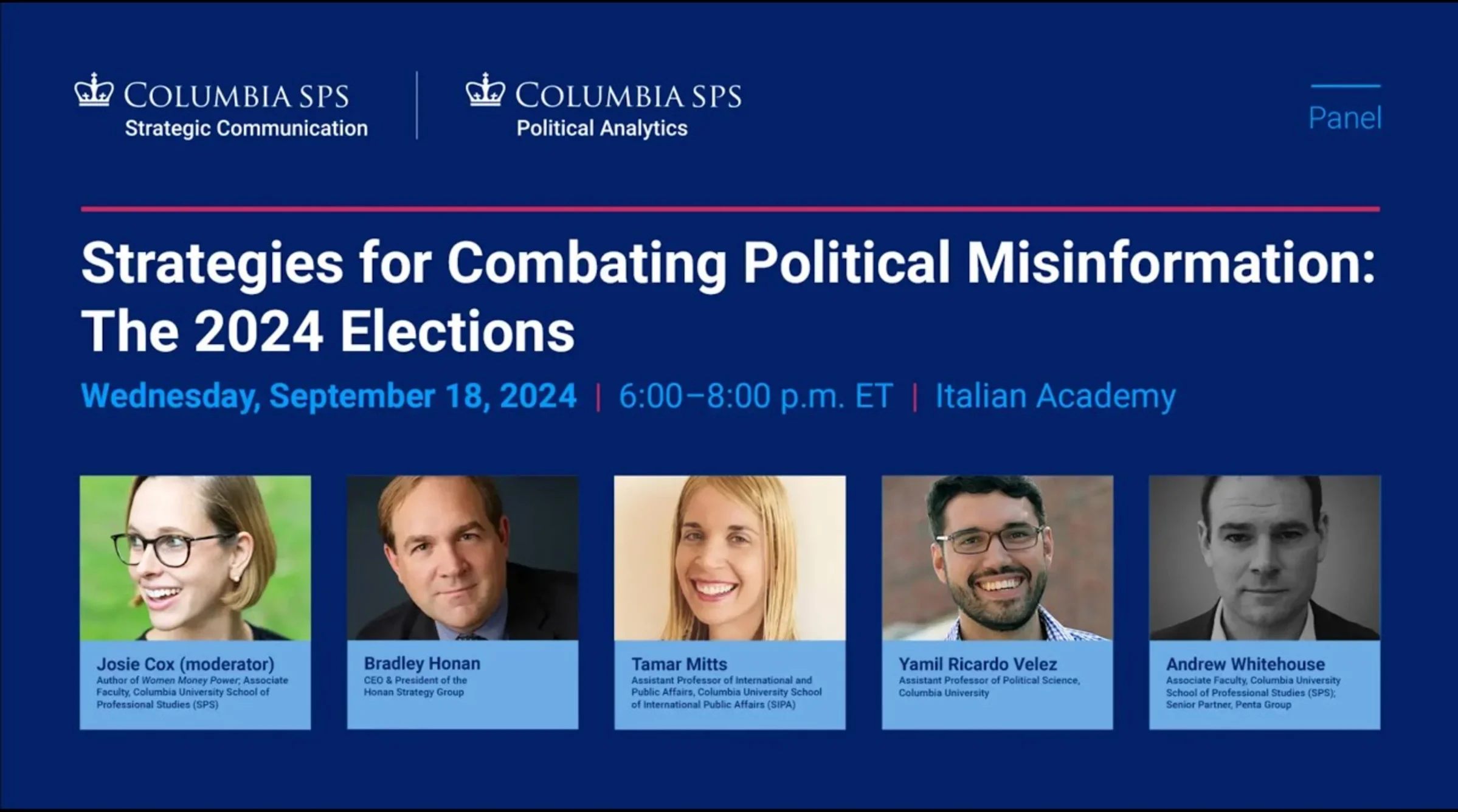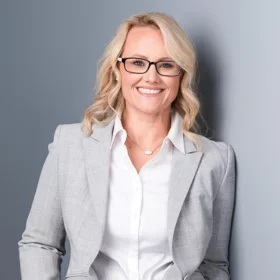With just eight weeks remaining before the U.S. presidential election, Columbia’s M.S. in Strategic Communication and M.S. in Political Analytics programs hosted a second “Strategies for Combating Misinformation” panel on September 18 at the Italian Academy. While some differences were raised, the conversation steered largely toward consensus about the fact that attempts to mislead voters are evident and solutions need to be widespread and have authority for enforcement.
Panelist Andy Whitehouse, SPS associate faculty and a senior partner at Penta Group, seemed to summarize much of the discussion to come in his opening comments. After drawing a distinction between misinformation (an inadvertent mistake) and disinformation (a deliberate deception), he noted that voters are concerned by the amount of fake information being disseminated. However, he acknowledged that whether or not the circulated false information was an honest mistake or a malicious tactic doesn’t really matter. "Does it make a difference in elections? I’m not so sure."
Columbia Assistant Professor of Political Science Yamil Ricardo Velez noted that regardless of its intention, false information can reinforce existing beliefs, foster distrust, and create “an environment of disengagement."
The problems associated with misinformation and disinformation during elections aren't exclusive to the United States and might not be identical across economic classes. Tamar Mitts, assistant professor of international and public affairs in the School of International Public Affairs, provided a global context to a conversation that tended toward the United States and the current presidential campaigns. She pointed out that a recent Department of Justice investigation showed that malicious Russian organizations had collected data about voter demographics and had plans for targeting them. But, she said, good research on the effectiveness of such efforts doesn’t exist.
“We clearly know that efforts to influence are massive and growing and that the tactics that are being used are becoming increasingly creative,” she said. “I think there’s some sort of mismatch between the amount of effort we are seeing to influence voters to evidence and their actual effect.”
Whitehead cited an UNESCO study showing that people in poorer countries tend to be more concerned about disinformation whereas people in wealthier countries rank themselves as being better able to distinguish between good and bad information when compared with the average news consumer.
As they neared the halfway point, moderator and SPS associate professor Josie Cox turned the focus toward the future, asking who bore responsibility for ridding elections of such negative influences.
Bradley Honan, CEO and president of the Honan Strategy Group, noted that the closing of newspapers and elimination of thousands of journalist jobs made it harder to correct bad information.
“This is a globally menacing problem and we need a global framework,” he said. “It’s important for Congress to react. If industry is not going to do more, there has to be government regulations, ideally at a global level.”

“Strategies for Combating Misinformation” panelists at Italian Academy. (Photo credit: Lucas Hoeffel)
During a brief Q&A prior to a reception, an audience member who identified herself as Brazilian-American pointed out that in many countries, misinformation is spread through channels that are difficult to regulate.
“I think you can fact-check all you want, but in Brazil what really matters is the dark web and WhatsApp, where tons of misinformation flows,” she said. “What do you do about the dark web?”
Mitts acknowledged an American centrism in the information being presented. “We have some sort of bias in our research toward the U.S. and developed democracies in political science, at least in recent years,” she said. “We have recognized that bias.”
Honan suggested that an effective global solution would involve a pact of mutual protection, likening the needed measures to an alliance like NATO.
“A lot of the same protections that we’ve used to keep Europe safe, to keep a lot of the world safe, has to be the same framework that we use,” he said. “It’s incumbent on the United States to establish a global framework, to establish more sophisticated listening systems. I think that’s got to be our role.”
About the Strategic Communication Program
Columbia University's Master of Science in Strategic Communication program is designed to respond to the urgent need for strategic perspectives, critical thinking, and exceptional communication skills at all levels of the workplace and across all types of organizations.
About the Political Analytics Program
The Columbia University M.S. in Political Analytics program provides students quantitative skills in an explicitly political context, facilitating crosswalk with nontechnical professionals and decision-makers—and empowers students to become decision-makers themselves.
The 36-credit program is available part-time and full-time, on-campus and online. The fall 2025 application priority deadline for the M.S. in Political Analytics program is February 15. The final deadline is June 1. Learn more about the program here.
For general information and admissions questions, please call 212-854-9666 or email politicalanalytics [[at]] sps [[dot]] columbia [[dot]] edu (politicalanalytics[at]sps[dot]columbia[dot]edu).



